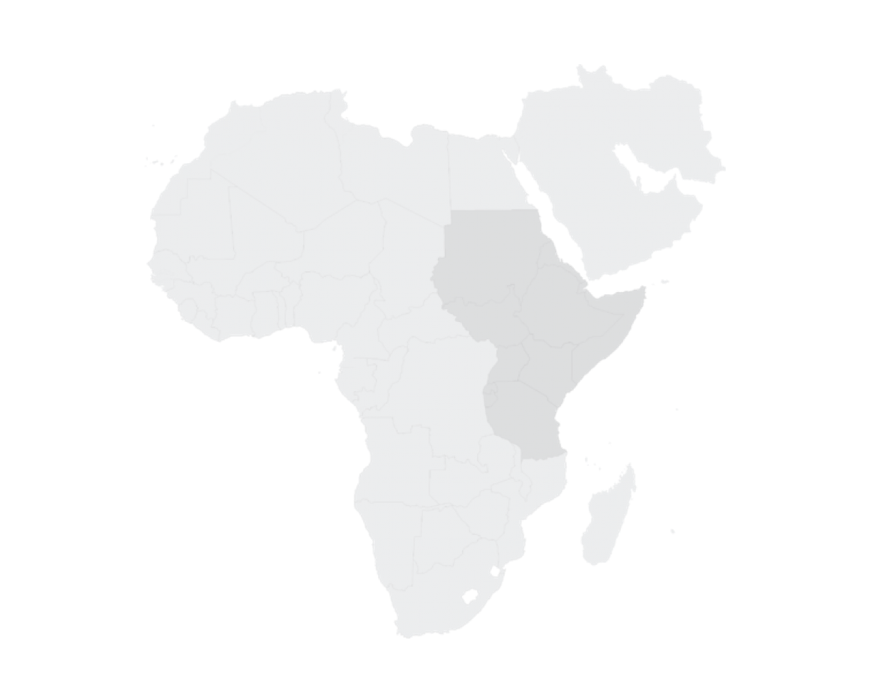Dear friends and colleagues,
February was a hectic month for DefendDefenders with many progressive endeavours. As we continued to monitor the situation for human rights defenders (HRDs) in the East and Horn of Africa sub-region, we particularly followed the progressive, yet fragile, developments in South Sudan. In our recent policy brief about the situation for South Sudanese HRDs, we reflect about the establishment of the Transitional Government of National Unity (TGoNU), and the need for protection mechanisms for HRDs in the country, as stressed by our HRD of the Month.
The month further illustrated the importance of close partnerships with like-minded organisations at the national, regional, and international level in order to meet the protection needs of HRDs in the sub-region.
A determined DefendDefenders delegation participated in the opening of the 43rd UN Human Rights Council (HRC/Council) to advocate for HRDs before the Council. We were pleased to meet with the UN Secretary-General, António Guterres, together with HRCnet partners, and the new UN Assistant Secretary-General for Human Rights, Ilze Brands Kehris.
In Kampala, my team and I were grateful to meet with Gerard Steeghs of the Dutch Ministry of Foreign Affairs, and representatives of the Dutch embassy in Uganda, to discuss our HRD protection work. I was further honoured to give the closing remarks at the #DigiSecCon2020 – an essential platform to highlight the manifold digital threats faced by HRDs.
DefendDefenders will continue to foster and nurture these fruitful relations as we work towards a region where human rights are respected and upheld.
Yours sincerely,
Hassan Shire
Human Rights Defender of the Month: Aluel Atem
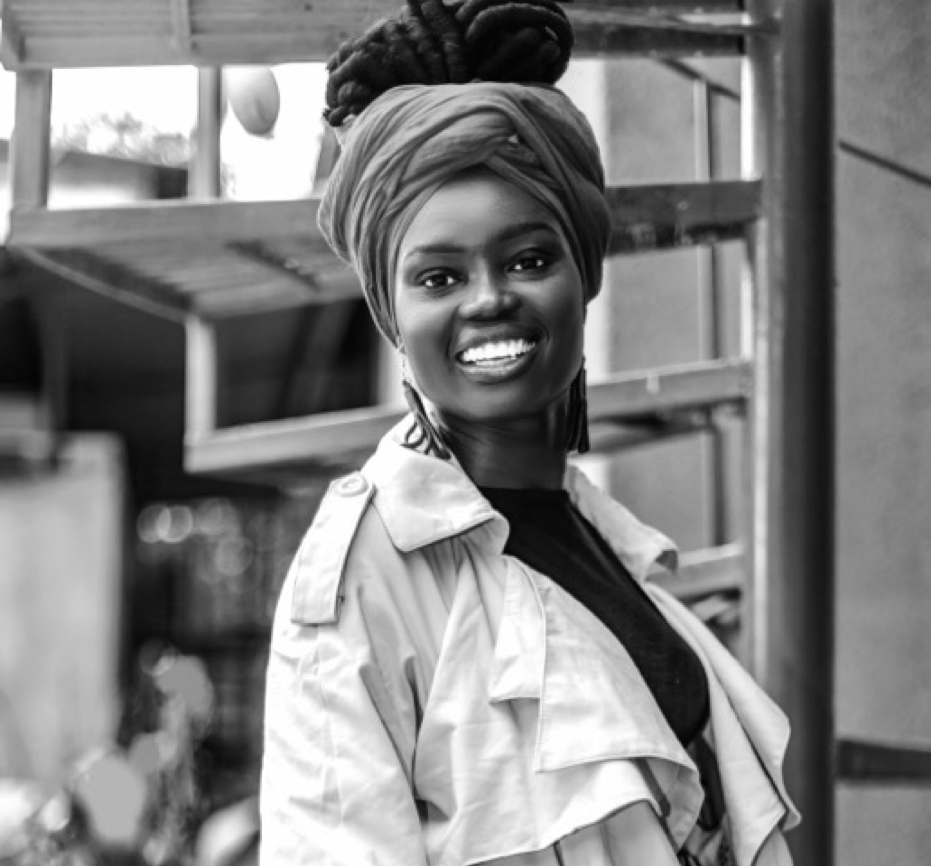
Aluel Atem is an ambitious woman activist from South Sudan who plays a vital role in the promotion of women’s rights in the country. However, life as an outspoken feminist in a patriarchal country is not a walk in the park. “It’s not only about being a female, but a young female. You get undermined for being a woman in all-man spaces, and for being young in older spaces,” Aluel explains.
Since the civil war erupted in December 2013, the situation for women in South Sudan has worsened, Aluel explains. “We have had a lot of conflict in South Sudan, which is not going to be solved very soon. We have a lot of conflict that’s historical – going deep.”
To promote women’s rights amid the long-standing and brutal conflict, Aluel co-foundedCrown the Women, an organisation focusing on raising awareness about sexual and gender-based violence (SGBV), and fostering female leadership and mentorship for women in South Sudan.
Did you know?
That DefendDefenders launched a podcast about HRDs as lawyers in the East and Horn of Africa? Check it out on SoundCloud.
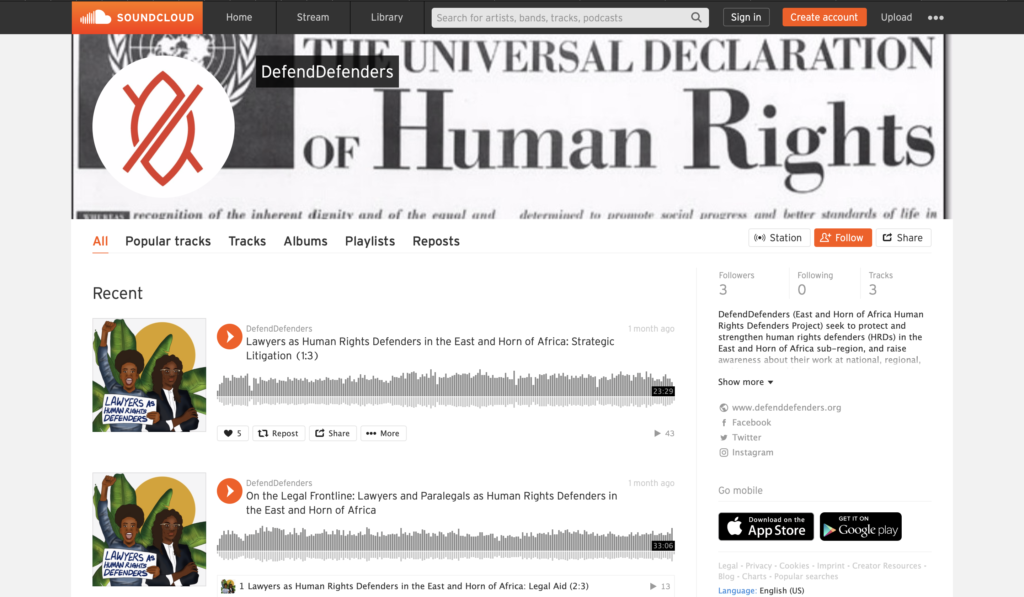
Recommended reading:
- Report: “If We Don’t Get Services, We Will Die” – Tanzania’s Anti-LGBT Crackdown and the Right to Health, Human Rights Watch, February 2020.
- Article: Fear keeps the families from speaking, The Star Newspaper, February 2020.
- Article: Climate change, wars, poverty stall AU target to silence guns by December, The East African, February 2020.
Updates from DefendDefenders:
- At the 43rdsession of the HRC (HRC43, 24 February-20 March 2020), DefendDefenders coordinated the drafting of a civil society letter calling for the renewal of the mandate of the UN Commission on Human Rights in South Sudan. We are also presenting a brief based on evidence gathered during a recent mission to the country. We signed on to another NGO letter, which calls for the renewal of the mandate of the UN Special Rapporteur on HRDs;
- At the start of HRC43, DefendDefenders and AfricanDefenders engaged states, dignitaries, UN officials, experts, and NGO partners, discussing issues of common interest and making the case for preventative action on country situations of concern, based on early warning signs and objective criteria.See more here;
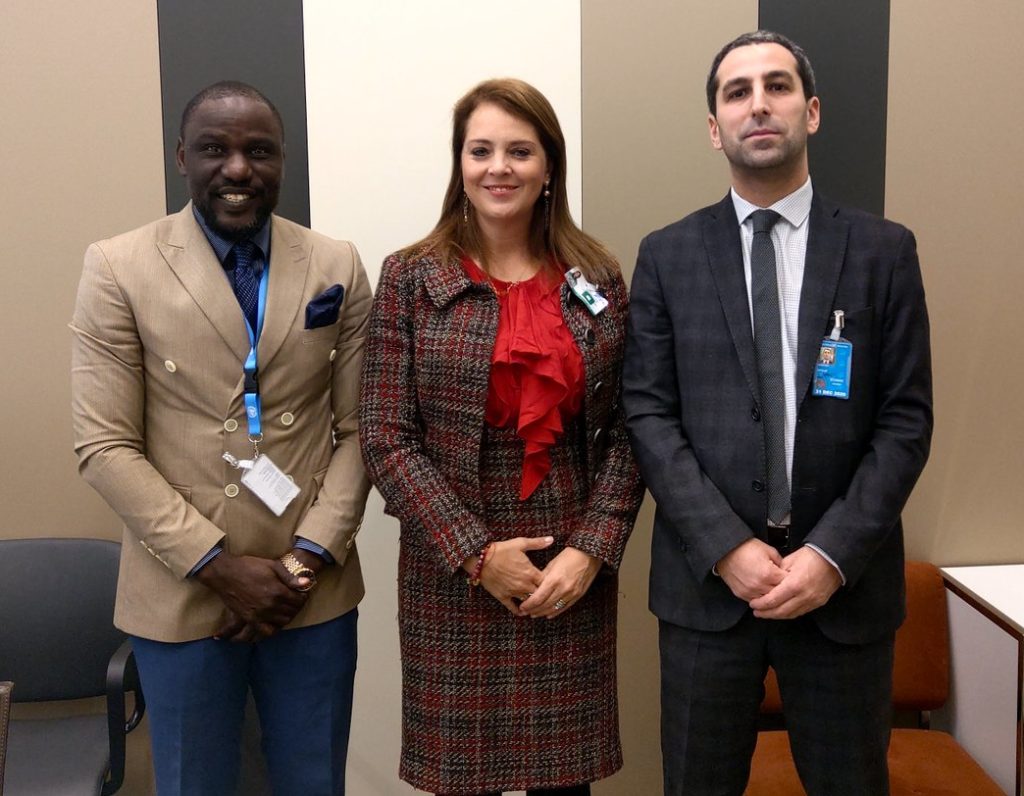
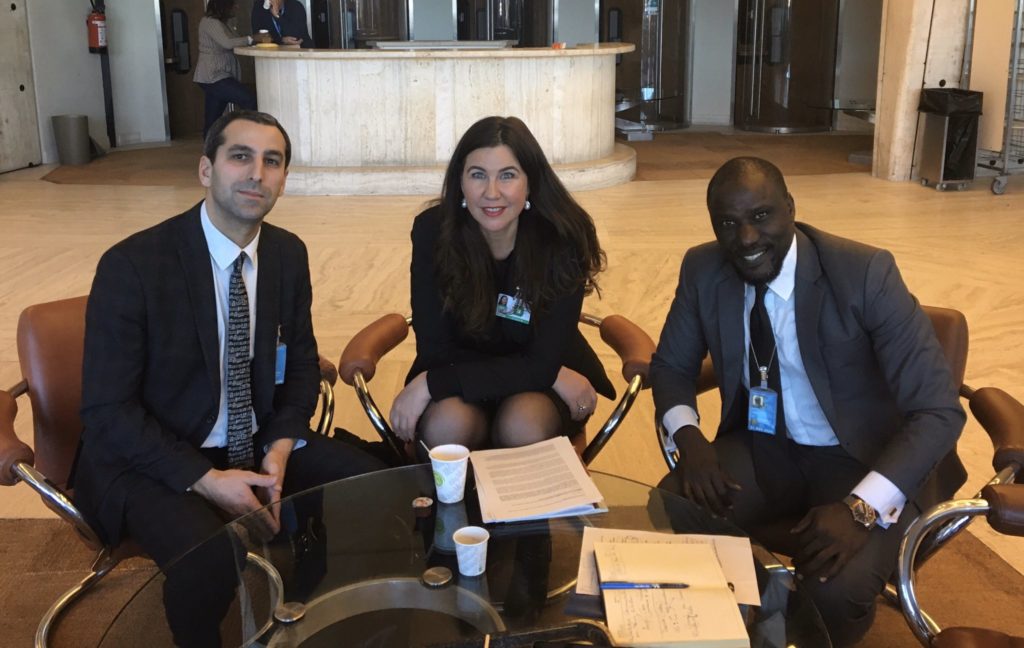
DefendDefenders and AfricanDefenders engaged with partners at the 43rd session of the UN Human Rights Council in Geneva, February 2020.
- In early February, a DefendDefenders team undertook a capacity building and research mission to South Sudan. Eight HRDs in Wau were trained in physical and digital security, while 32 key stakeholders were interviewed to inform advocacy and research efforts;
- On 20-21 February, DefendDefenders took part in the Kenyan Protection Working Group retreat, which brought together national, regional, and international organisations engaged in the protection of HRDs at risk;
- With financial support from the United States Embassy in Uganda, DefendDefenders launched an Artist Therapy Studio at our premises in Kampala, as part of our resourcing resilience initiative. The initiative is geared towards ensuring the wellbeing of HRDs to allow them to continue their crucial work;
- On 14 February, DefendDefenders attended the Digital Security Conference in Kampala, Uganda, organised by Defenders Protection Initiative, where Hassan Shire, our Executive Director, delivered the closing remarks;
- On 24-28 February, the second Ttaala workshop was organsied in Kampala, Uganda, welcoming six Ugandan human rights organisations. The workshop raised their capacity in digital communications, including social media, website management, video editing, encryption, and report writing;
- In February, DefendDefenders conducted a set of capacity building trainings for HRDs, including a digital securitytraining in Kampala for HRDs working in the extractives industry; a one-day art therapy camp aimed at equipping HRDs with the skills to ensure their well-being; and a follow-up training of trainers (ToT) in Wau, South Sudan for South Sudanese HRDs;
- In February, DefendDefenders joined as a partner on CloudFlare’s Project Galileo. Cloudflare offers website security defense against denial of service attacks and other online threats; and
- In February, DefendDefenders received 24 protection requests. 11 are under review, seven were approved, five did not meet the criteria, and one was referred to a like-minded organisation.
Updates from AfricanDefenders:
- Since January 2020, AfricanDefenders has received seven protection support requests under the Ubuntu Hub Cities, where one was rejected, and the others are under review; and
- On behalf of DefendDefenders, AfricanDefenders attended a workshop facilitated by the International Civil Society Action Network to share experiences and best practices in the protection of women peacebuilders.
Human rights updates from the East and Horn of Africa sub-region:
Burundi
- The Burundi’s Truth and Reconciliation Commission uncovered more than 6000 bodies in six mass graves in the country – the largest since the government launched a nationwide excavation at the beginning of the year.
Ethiopia
- Ethiopia’s parliament has passed the Hate Speech and Disinformation Prevention and Suppression Proclamation to prevent hate speech and fake news. Human rights groups have raised concerns that the law significantly curtails freedom of expression as it imposes heavy fines and long jail terms.
Eritrea
- Civil society organisations called on Eritrean President Isaias Afwerki to explain the continued imprisonment and the condition of Swedish-Eritrean journalist Dawit Isaak, and his colleagues, who have been in custody since 2001.
- President Afeworki accused the Tigray People’s Liberation Front (TPLF) of creating hurdles to resolve the unsettled border issue with neighbouring Ethiopia – calling the TPLF a “failed political group” in Tigray.
Kenya
- Kenya’s ex-President, Daniel Arap Moi, passed away. His death sparked debate about the murder of key opposition leaders that occurred during his regime, many of which were dismissed as suicide at the time.George Kegoro, the Executive Director of the Kenya Human Rights Commission, argued that Moi, who ruled for 24 years, should have paid for his tyranny, adding that his administration misruled the country.
- Kenyan police killed 107 people in 2019, according to a report from a coalition of Kenyan human rights groups. Most of the victims were young men from slum areas.
Rwanda
- A BBC Africa journalist, Jacques Matand Diyambi, has been fired for “serious misconduct” regarding his controversial interview regarding the France-Rwanda relationship. BBC claims that they were forced to act following a complaint from the Rwandan government. Kigali denies any intervention.
- Rwandan singer Kizito Mihigo, whose music was banned by the current regime, allegedly committed suicide while in police custody. Mihigo was sentenced to ten years in jail in 2015 for conspiracy against the government, but later released on pardon. Amnesty International has called for the speedy investigations into this death.
Somalia/ Somaliland
- The two men convicted of the rape and murder of a 12-year-old girl in Somalia were executed. Her case, the first ever televised rape trial in Somalia, sparked widespread public outcry and appeals for justice under the hashtag #JusticeforAisha. It was also the first case in which DNA was used to obtain a conviction.
Sudan
- On 11 February, Sudan’s transitional authorities have agreed to hand over ousted leader Omar al-Bashir to the International Criminal Court (ICC), which could mean that the former president will finally face justice for grave international crimes in Darfur.
- A Beirut-based Sudanese activist, Mubarak Ibrahim, risks being deported to Sudan, despite threats to his safety in Sudan. The Anti-Racism Movement, a grassroots movement of Lebanese activists and migrant workers, continues to support his case.
South Sudan
- On 22 February 2020, the warring parties to the Revitalized Agreement on the Resolution of Conflict in South Sudan agreed to form a Transitional Government of National Unity . It was also announced that the country would revert to ten states to maintain peace. But the crucial part of uniting the armed forces is yet to be completed.
- President Salva Kiir was named the top “spoiler of peace” in a new, dubious award that seeks to shame him and others into taking serious steps to end the conflict in the country. Ateny Wek Ateny, a spokesman for South Sudan’s presidency, described the award as “nonsense.”
- The University of Juba has suspended Taban Lo Liyong, a renowned academic and writer, from his teaching position over an opinion article on the issue of states and boundaries. The university claimed that the article amounted to “incitement of ethnic hatred.”
Tanzania
- On 24 February, freelance journalist Erick Kabendera was released from prison, but still faces hefty fines on charges of money laundering and tax evasion.
- Members of Tanzania’s ruling party have lashed out at a senior opposition politician, Zitto Kabwe, for his criticism of a controversial USD 500 million World Bank education loan. The move is seen as a backlash against freedom of expression and a way to intimidate outspoken leaders.
- The Government of Tanzania has remained silent over the recent action by US Secretary of State Mike Pompeo banning Dar es Salaam’s Regional Commissioner Paul Makonda from entering the US, as they are deeply concerned over deteriorating respect for human rights and the rule of law in Tanzania.
Uganda
- 19 Members of Parliament (MPs) signed a censure motion against Security Minister General Elly Tumwine for frustrating investigations into torture of Ugandans, and blocking MPs in the Human Rights Committee from doing their work. The motion was however suspended for failure to raise the required number of signatories.
- Stella Nyanzi, the Ugandan feminist, academic, and writer, was released from prison after her 18-month sentence for insulting President Yoweri Museveni was quashed.
- The Ugandan Parliament has set in motion a process that might see the Maragoli people recognised as an indigenous Ugandan community.

